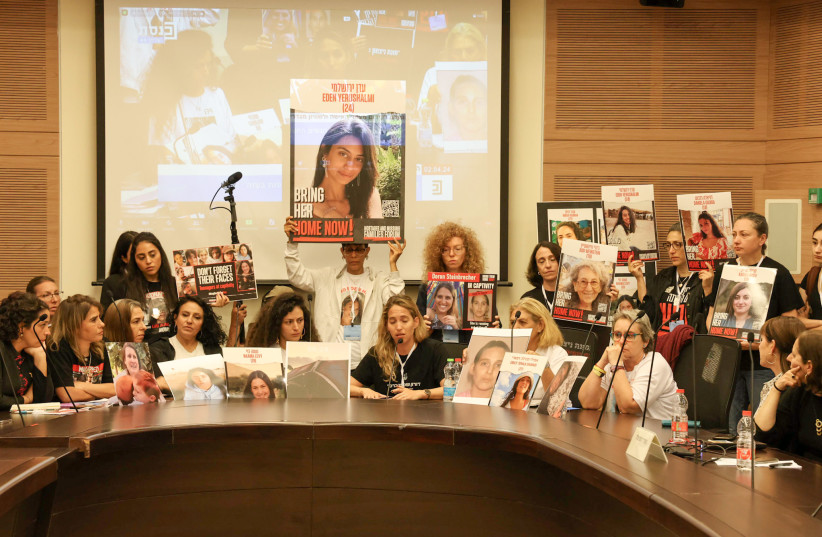Every Israeli woman who is being held captive by Hamas in Gaza is being sexually abused, freed hostage Mia Regev said during an emergency debate in the Knesset's Committee on the Status of Women and Gender Equality on the situation of the women hostages.
Regev, who was freed during the hostage deal between Israel and Hamas in November, said that it was "unbelievable" that the Knesset was planning on going on recess on April 8 for over five weeks.
"Every day, there is an emergency and every minute counts. What will the women do there? What will the rest of the captives do there?" Regev said.
Yaffa Ohad, the aunt of the captive Noa Argamani, said that recent reports of both Amit Soussana, who described to the New York Times how her captor sexually attacked her at gunpoint, and of a Hamas captive who described in an interrogation how he raped an Israeli woman in a Kibbutz on October 7, have broken the families' spirit. Ohad warned that time was running out, not just for the captives but for their families in Israel.
"Do you want there to be 100,000 Itzik Saidyans?" Ohad said, referring to the released soldier who self-immolated in 2021 after years of struggling to receive the care he sought for PTSD.

Yarden Gonen, sister of hostage Romi Gonen, and Shai Dickman, cousin of hostage Carmel Gat, detailed horrific accounts of eyewitnesses from October 7 that included rape, genital mutilation, and torture.
"Why are you letting my sister remain there? What did she do wrong? Why do I need to be here and beg?" Gonen said. "Why do I not see ministers echoing this throughout the world? I've had enough," Gonen said.
The session was deeply emotional, and many of the people at the session broke into tears and sobs while they and others were speaking.
Sharon Cunio, who was released from captivity in November along with her three-year-old twins, and whose husband is still in captivity, said, "As a woman who was there, the terror is never ending and is indescribable. It is the never-ending terror that you will be hurt, that there is no one to save you, and that you are at the mercy of Hamas."
'Please do not forget the men'
Cunio said that along with the terrible experiences of women, she needed the men, including her husband David, to return as well. "My husband is my strength, and I have no strength left," she said.
"Please do not forget the men," she said while sobbing. "You must reach a deal for everyone, even if in stages," she said.
Politicians from the opposition attacked the government for not sending any representatives to the discussion. "In a normal world, the Minister for Women's Affairs would be here or would gather all of the ministers to hear the testimonies. This is a weak government," Yesh Atid MK Merav Ben-Ari said. Religious Zionist Party Michal Woldiger responded, "Then you are surprised that they do not come," to which committee chairman MK Pnina Tamano-Shata (National Unity) said, "Do not threaten me, they must be here."
Gil Dickman, brother of Shai and cousin of hostage Carmel Gat, responded to the exchange, "This threatening language of members of Knesset is what we hear every day, no minister comes. The defense minister, prime minister, and all ministers must be here. While we are here, the prime minister's spokesperson said that the public does not support the return of the hostages. We need to hear condemnation of this comment," Dickman said.
The sexual abuse against female hostages has been one of the main arguments for a hostage release and ceasefire deal. Former hostage Amit Soussana came forward last week and was the first woman to come on record and reveal that she herself had been sexually abused while being held hostage.
Even the United Nations report released in early March found "clear and convincing information that sexual violence, including rape, sexualized torture, cruel, inhuman, and degrading treatment has been committed against hostages."
Later on Tuesday, other hostage families handcuffed themselves to each other during a Knesset Foreign Affairs and Defense Committee session, in which The Association of Rape Crisis Centers in Israel presented a report on sexual abuses of Israelis on October 7 and its aftermath in Gaza.
In a written statement, the families called the move "a call on members of Knesset not to head to recess, not to continue on routinely and join the struggle to free the hostages, and replace the prime minister who is a barrier to a deal."
"If the hostages have no freedom, neither will elected officials," the families said.
Tamar Uriel-Beeri contributed to this report.
